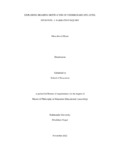
Please use this identifier to cite or link to this item:
https://hdl.handle.net/20.500.14301/148| Title: | EXPLORING READING MOTIVATION OF UNDERGRADUATE LEVEL STUDENTS: A NARRATIVE INQUIRY |
| Authors: | Maheshwor Mahat, Maheshwor |
| Citation: | Mahat,M.(2022).Exploring reading motivation of undergraduate level students: A narrative inquiry |
| Issue Date: | Nov-2022 |
| Publisher: | Kathmandu University School of Education |
| School: | SOED |
| Department: | DOEL |
| Level: | M.Phil. |
| Program: | MPhil in Educational Leadership |
| Abstract: | The research topic Exploring Reading Motivation of Undergraduate Level Students: A Narrative Inquiry, sprouted from my confession as a late reader and my realization that only a handful of students remain as readers by the time they enrol in undergraduate levels. My study aimed to explore the reasons of reading motivation among undergraduate-level students. I selected four undergraduate-level avid readers as participants from two different institutions in Kathmandu and Lalitpur districts. Applying narrative inquiry and adopting an interpretive paradigm relating to my ontological, epistemological and axiological stance, I collected information via the participants’ narratives. For the theoretical foundation of the research, I substantiated motivational and social constructivist theories as the key theories since the students were motivated to read for various psychological and social reasons. To explore psychological aspect, I applied Self-Determination Theory and Value Expectancy Theory. On the other hand, I employed social constructivist theory to analyze the societal influences in their reading. These theories were used as a parallel of my research which enabled me to think analytically and encouraged me to act reflectively throughout the entire research journey. Furthermore, I got various insights from my research participants on reading motivation. According to the participants’ stories, their social circle, teachers, home environment, and self-interest all drove them to read books. Home influence, where parents impart a love for reading and kindle reading yearning in children, is central to influencing children to imbibe reading habits from their early childhood. Similarly, their narratives indicated that individual teachers play instrumental role in motivating students to read even though the schools have no particular reading program. It was also found that social circle like friends, book clubs, neighbors and social media encourages students to recognize reading as a social activity. Finally, in the initial stage, extrinsic reasons are instrumental in motivate students to read books; in later years, their self-interest or the ‘Me’ element support in becoming a lifelong reader. This study contributes to the stakeholders’ awareness of why students read books informing them about major contributors to students’ motivation. This study helps parents, teachers, curriculum designers and policymakers explicitly to set the reader-centric provisions for nurturing reading motivation in Nepal. |
| URI: | https://hdl.handle.net/20.500.14301/148 |
| Appears in Collections: | Dissertation |
Files in This Item:
| File | Description | Size | Format | |
|---|---|---|---|---|
| final thesis Mahesh Mahat .pdf | 1.19 MB | Adobe PDF |  View/Open |
Items in DSpace are protected by copyright, with all rights reserved, unless otherwise indicated.